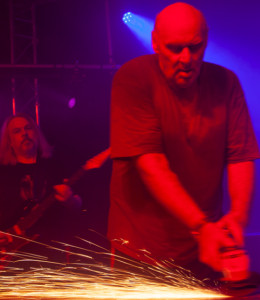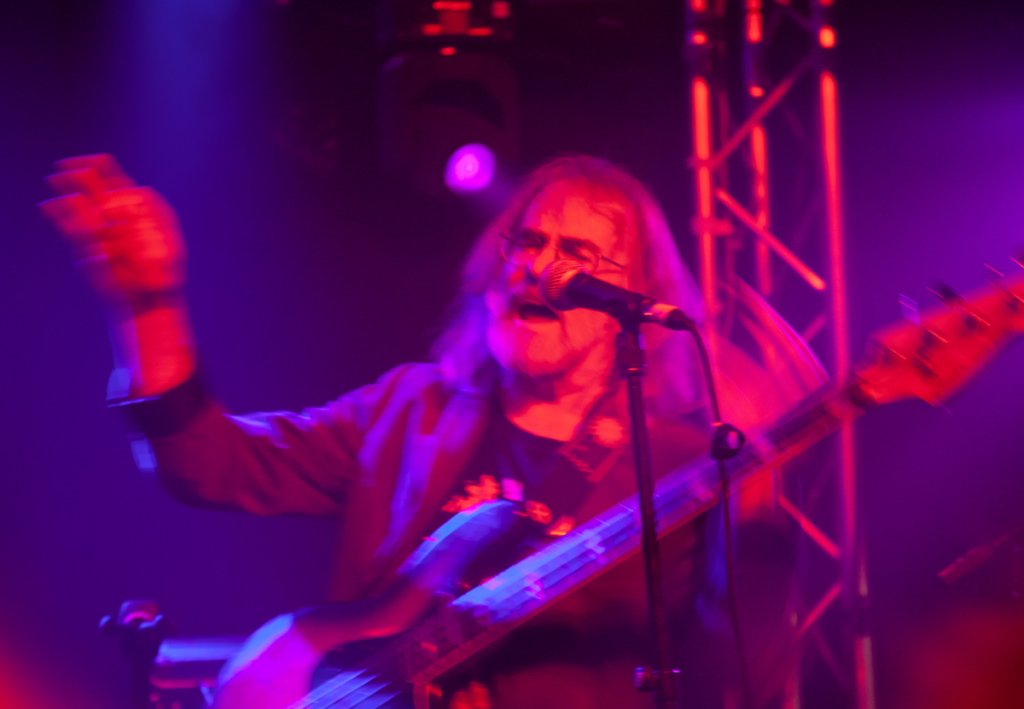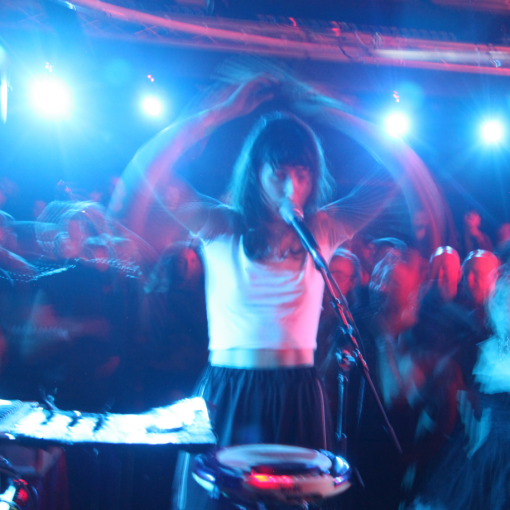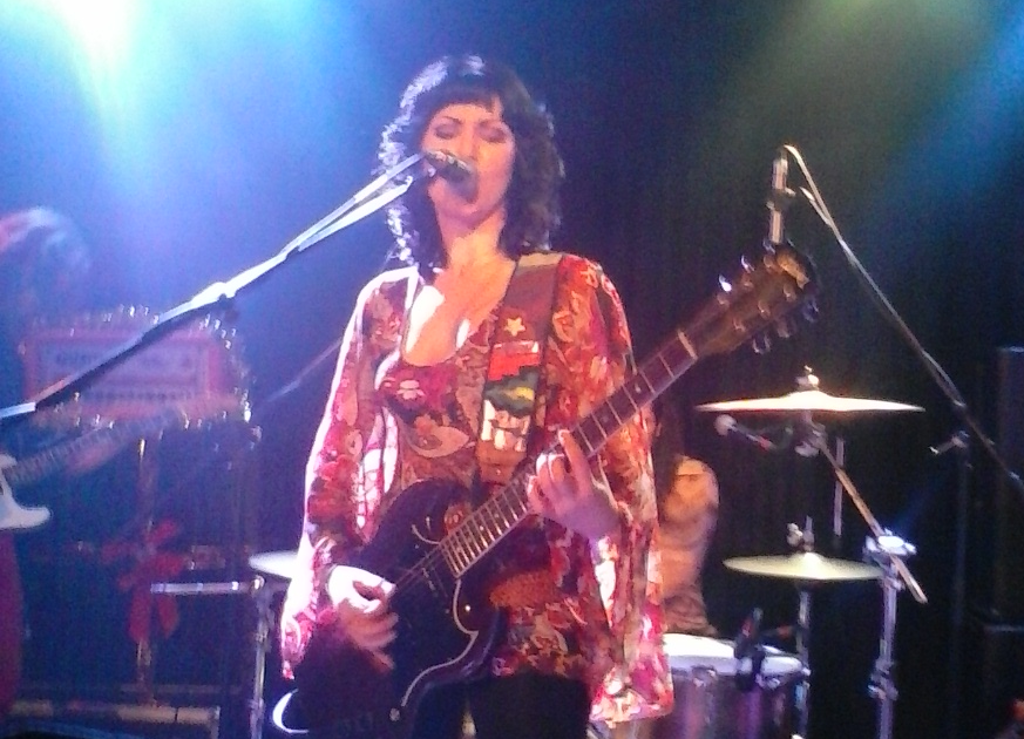London
14 September 2019
 After a tortuous journey through London and around the building site that is Hackney Wick at the moment, we find ourselves standing outside Studio 9294, one of the many curious venues that Baba Yaga’s Hut uses for its shows. Steel shuttered doors and a street art facade lead us into the concrete bunker that is serving the three bands tonight.
After a tortuous journey through London and around the building site that is Hackney Wick at the moment, we find ourselves standing outside Studio 9294, one of the many curious venues that Baba Yaga’s Hut uses for its shows. Steel shuttered doors and a street art facade lead us into the concrete bunker that is serving the three bands tonight.
Sadly, due to traffic and problems with road closures around the venue, we are late for Datashock and only end up with the last five minutes, which in some respects made it worse because what we see is most intriguing. They had left the stage and invaded the audience’s domain, and it is hard to see who is in the group and who is watching. The guy behind the banks of electronics is clearly part of the group; but is the guy shoving a metal chair across the rough concrete floor part of it too? Apparently so, as well as the guy laying on the floor by some ping-pong balls with a vibrating bean nestled in a copper dish creating a distinctive hum. It is performance art and electronic terrorism at the same time, and it was a pity to miss the full effect.
After a little shuffling things around and filling the room with dry ice, Camera take to the stage, the lighting alternating red and blue, changing the mood and feel with every swing. Now expanded to a four-piece, with another keyboard player mixing the sound of the Moog with a Roland amongst others, the intro is a long extended drone with distorted bass rumblings, with the red light and dry ice casting the band as a group of post-apocalyptic wanderers searching through the soundscape. As the other three rustle up a dust storm, Michael Drummer wrestles with what looks like an old skateboard strung with one string, which he beats repeatedly against an amplifier to draw out a dirgey growl that adds to the sulphurous mix. I must confess, I was expecting more of a song-based set, but this diversion into more drifting, experimental waters is just the ticket. The noises attack and decay, and at points resemble an array of escaped insects being strafed by passing warplanes. Every space in the sonic palette is taken up, but when Michael turns his attentions to the drums, the intensity is ramped up a notch or two. Album-wise their mix is often evened-out, but live the drama pivots round the percussives. With the barest of kit he’s a compelling character who makes do with snare, floor tom, cymbal and a foot-operated tambourine and plays standing with his head bent towards them, so all we can see is the crown of his head and flailing hair. Once the rhythm kicks in, it is hard to take your eyes off him, putting his knee on the tom for more pressure, draping the drums with a curtain to change the timbre, pressing pedals on the floor to cause other mysterious effects.All the while, the other three shower us with wave after wave of distorted and jagged contusions. At times, when things are darker, they shimmer like a shadow haze, just on the edge of your hearing, particularly Alex Kozmidi on guitar, who pulls face after face as the instrument wriggles and bucks in his hand, curving a crooked calypso. Most of the time it is about texture and shade, but when he locks in with Michael’s blasts, Camera’s love of the motorik rears its head above the parapet as the guitar chases the Roland through abandoned buildings and across dizzying precipices. Michael’s stick flies from his hand and a palm switchblades the established rhythm before a fresh drum stick tips the drum’s edge in escalating ellipticals. At other times as the pace slows, you feel the keyboards emerging from the fractured murk, crawling from oozing slime as Michael places a huge cymbal over the snare for added sharpness.
A complex storm of textures prevails, euphorically slants into a collapsing tempo as this weird purr bounces between all assembled, which the guitarist scoops into a shower of effects, and you realise that quite a lot of time has passed. Camera seem to have left the memory of those first few albums far behind them on their way to becoming a compulsive and dynamic live act, leaning as much on long-form improv as on the hypnotic rhythms for which they are renowned. As Jean-Hervé Péron jokes at the start of the FaUSt set, they are going to have to stop inviting Camera to play with them, because they are becoming too good; and from the strength of tonight, we thoroughly agree. The thing is, FaUSt could invite anybody to tour with them but nobody could ever upstage them, and not just because they have a concrete mixer on stage tonight. There is something about Jean-Hervé’s absolute love and enthusiasm for the music, for the audience and the whole spectacle of being part of a fifty-year-old rock tradition that engenders love and respect from the assembled throng of joyful listeners. Then there is Zappi Diermaier‘s benevolent presence, sat at the back behind the drums like a kindly uncle, watching his younger charges cause musical mayhem in front of him. The fact that a group with their history and pedigree are playing to 150 people in a dishevelled warehouse is partly a crime, but partly a pleasure that they are still a hidden gem after all this time.Zappi and Jean-Hervé are joined tonight by Amaury Cambuzat on guitar and Pierre Chevalier on piano and keyboards, plus a sheet of metal on a trestle, half an oil drum and a gas canister. Before starting, Jean-Hervé thanks everybody and spills his love and joy onto the audience before exiting and allowing Pierre to play the most glorious piano intro for about five minutes. The sounds ebb and flow as if we had a Bossendorfer grand in front of us, rolling and swelling. The bass notes vibrating our internal organs come directly from some some terrible house of mirrors, and towards the end, as he starts to bend the pitch of the notes, a sense of queasy unease infects the hall until the rest of the band appears and Pierre Chevalier launches into a circular children’s motif as Jean-Hervé’s bass notes hit hard, rumbling and groaning with the spectral space swirls emanating from Amaury’s guitar.
Plenty of golden oldies from Faust’s vast discography ensue, most of which are reconstituted in some form or other, but we are both happily too lost to the enthusiastic thrall of it all to be arrowing an exact set-list. Certainly, three from their second album So Far make an appearance, but sadly there is no first album “Wonderful Wooden Reason” goodness, and I think we both detect the curling lilt of The Faust Tapes somewhere in there too. The whole set feels spontaneous, with lots of power-tooled whirrs and drilled metallics; at one point Jean-Hervé rubs a long serrated shaft on the corner of his brazier to great affect. The wayward groove of the set is great, and Jean-Hervé’s bass playing just seems to improve with age, fitting in perfectly as Alex from Camera takes the stage and begins a guitar duel with Amaury, both egging the other on as we are showered in shards of aural sparks and shuddering feedback, evoking industrial machinery on the rampage. By contrast, the reggae rhythms and tambourine-laden Canterbury breaks of “The Sad Skinhead” and “I’ve Got My Car And My TV” highlight the youthful bass playing and the more whimsical side of their songwriting, with Pierre Chevalier’s falsetto on the latter playing footsie with Amaury and Jean-Hervé’s more resonant voices.At one point, Jean-Hervé attempts to enlist the audience in clapping out the rhythm for “Psalter”, which is rather complicated, making dancing difficult with us concentrating on clapping; but for Zappi it is just effortless, as the whole evening seemed to be. For somebody in their seventies for whom accessing the stage was tricky at times, his precision and ease behind the drums is a real pleasure to watch, and when accompanied by bowed guitar and Pierre’s harpsichord effect, it is transporting. The vibrations from the piano do take you by surprise, and then Zappi comes up to the front to unleash a sander on his strip of metal, with the echoing sounds oddly submerged as Jean-Hervé drills the inside of the oil drum with ear-splitting effect. Their distended soundscape is out of this world, and only goes to highlight what makes the group unique.
It sounds as though Jean-Hervé and Amaury are trading the line “Welcome to the city”on the delightful Faustfunk of another song (the name of which has sadly escaped me) and the angle grinder, when it makes its welcome appearance, is almost drowned out by the rest of the noise generated as Pierre’s piano droplets rain down on outstretched arms. Obviously, they can never escape from playing “It’s A Rainy Day, Sunshine Girl”, and here the mantra-like delivery is so simple and effective; they are so effusive in their delivery, with Amaury adding delicate guitar textures and ultra fast strumming, that you can’t help but be carried away. “Stretch Out Time” is almost honky-tonk, but is the complete antithesis to Zappi’s German poem, delivered with much dramatic gesticulating under a blue light backing and the Mellotron sounds emanating from Pierre’s bank of machines. Mic thinks it might be Bertolt Brecht, but whatever it is, his delivery is sublime and rather affecting, as the crowd’s focus is transported briefly to some smokey Weimar cabaret. Disconnected’s “Lass Mich” is Jean-Hervé’s discourse on the woes of modern society, its lumbering piano elegance backed by the flickering light of Zappi’s prowess. “I have some thoughts in my head, some confused thoughts in my head”, goes Jean-Hervé as he recounts a super-communicated world where real communication is sadly absent. The inevitable groove of “Krautrock” kicks up a similar storm, and here, two of Camera are again on stage, providing tambourine and more guitar squalls as THAT groove, purloined by so many over the years, has its desired effect on the audience.It is so hypnotic and with the way everybody piles in, you feel that in an alternate universe there is a FaUSt on stage playing that song forever, the audience unable and unwilling to leave. The final track before the Vaudeville of the goodbye song is a fantastic interpretation of “Fish” from Fresh Air, enlisting the services of the cement mixer for extra rhythmic assistance to the stodgy drums, Jean-Hervé adding a bit of trumpet to the fray.
It is a rather desolate and cracked soundscape that accompanies Jean-Hervé’s observations, so we are thankful for the slightly crazy music hall air of the final song, “Men From The Moon” from You Know Faust, and once the group has dragged members of the support bands, the road crew and other loved ones onto stage for a farewell wave, they are off, Jean-Hervé still smiling, still caught up in the whole beauty and joy of the event. As ever, that feeling leeches its way into the audience, and whether we had an armful of Bureau-B product under our arms or not, we leave with big crazed grins affixed to our faces.For the sake of anyone who loves music, long may FaUSt prosper and continue to thrill us.
-Words: Mr Olivetti –
-Words and pictures: Michael Rodham-Heaps-




2 thoughts on “FaUSt / Camera / Datashock (live at Studio 9294)”
Thanks for this nice review! The poem recited by Zappi is from Max Ernst.
thanks for the info